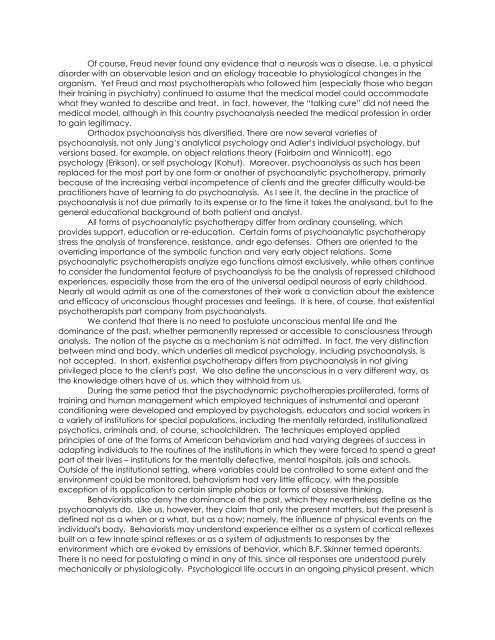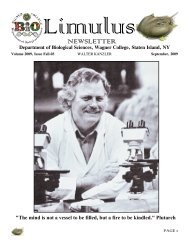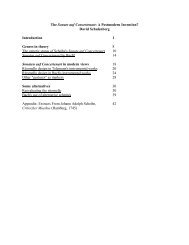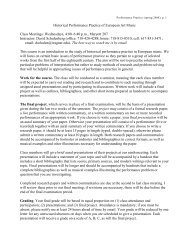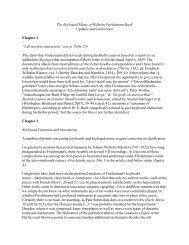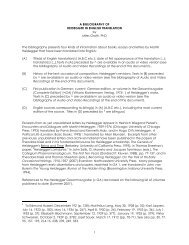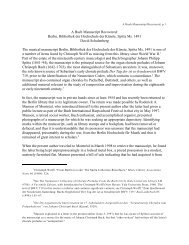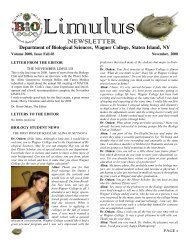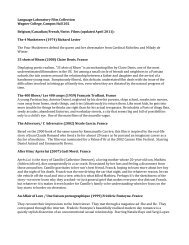SEVEN PAPERS ON EXISTENTIAL ANALYSIS ... - Wagner College
SEVEN PAPERS ON EXISTENTIAL ANALYSIS ... - Wagner College
SEVEN PAPERS ON EXISTENTIAL ANALYSIS ... - Wagner College
You also want an ePaper? Increase the reach of your titles
YUMPU automatically turns print PDFs into web optimized ePapers that Google loves.
Of course, Freud never found any evidence that a neurosis was a disease, i.e. a physical<br />
disorder with an observable lesion and an etiology traceable to physiological changes in the<br />
organism. Yet Freud and most psychotherapists who followed him (especially those who began<br />
their training in psychiatry) continued to assume that the medical model could accommodate<br />
what they wanted to describe and treat. In fact, however, the “talking cure” did not need the<br />
medical model, although in this country psychoanalysis needed the medical profession in order<br />
to gain legitimacy.<br />
Orthodox psychoanalysis has diversified. There are now several varieties of<br />
psychoanalysis, not only Jung’s analytical psychology and Adler’s individual psychology, but<br />
versions based, for example, on object relations theory (Fairbairn and Winnicott), ego<br />
psychology (Erikson), or self psychology (Kohut). Moreover, psychoanalysis as such has been<br />
replaced for the most part by one form or another of psychoanalytic psychotherapy, primarily<br />
because of the increasing verbal incompetence of clients and the greater difficulty would-be<br />
practitioners have of learning to do psychoanalysis. As I see it, the decline in the practice of<br />
psychoanalysis is not due primarily to its expense or to the time it takes the analysand, but to the<br />
general educational background of both patient and analyst.<br />
All forms of psychoanalytic psychotherapy differ from ordinary counseling, which<br />
provides support, education or re-education. Certain forms of psychoanalytic psychotherapy<br />
stress the analysis of transference, resistance, andr ego defenses. Others are oriented to the<br />
overriding importance of the symbolic function and very early object relations. Some<br />
psychoanalytic psychotherapists analyze ego functions almost exclusively, while others continue<br />
to consider the fundamental feature of psychoanalysis to be the analysis of repressed childhood<br />
experiences, especially those from the era of the universal oedipal neurosis of early childhood.<br />
Nearly all would admit as one of the cornerstones of their work a conviction about the existence<br />
and efficacy of unconscious thought processes and feelings. It is here, of course, that existential<br />
psychotherapists part company from psychoanalysts.<br />
We contend that there is no need to postulate unconscious mental life and the<br />
dominance of the past, whether permanently repressed or accessible to consciousness through<br />
analysis. The notion of the psyche as a mechanism is not admitted. In fact, the very distinction<br />
between mind and body, which underlies all medical psychology, including psychoanalysis, is<br />
not accepted. In short, existential psychotherapy differs from psychoanalysis in not giving<br />
privileged place to the client's past. We also define the unconscious in a very different way, as<br />
the knowledge others have of us, which they withhold from us.<br />
During the same period that the psychodynamic psychotherapies proliferated, forms of<br />
training and human management which employed techniques of instrumental and operant<br />
conditioning were developed and employed by psychologists, educators and social workers in<br />
a variety of institutions for special populations, including the mentally retarded, institutionalized<br />
psychotics, criminals and, of course, schoolchildren. The techniques employed applied<br />
principles of one of the forms of American behaviorism and had varying degrees of success in<br />
adapting individuals to the routines of the institutions in which they were forced to spend a great<br />
part of their lives – institutions for the mentally defective, mental hospitals, jails and schools.<br />
Outside of the institutional setting, where variables could be controlled to some extent and the<br />
environment could be monitored, behaviorism had very little efficacy, with the possible<br />
exception of its application to certain simple phobias or forms of obsessive thinking.<br />
Behaviorists also deny the dominance of the past, which they nevertheless define as the<br />
psychoanalysts do. Like us, however, they claim that only the present matters, but the present is<br />
defined not as a when or a what, but as a how; namely, the influence of physical events on the<br />
individual's body. Behaviorists may understand experience either as a system of cortical reflexes<br />
built on a few innate spinal reflexes or as a system of adjustments to responses by the<br />
environment which are evoked by emissions of behavior, which B.F. Skinner termed operants.<br />
There is no need for postulating a mind in any of this, since all responses are understood purely<br />
mechanically or physiologically. Psychological life occurs in an ongoing physical present, which


